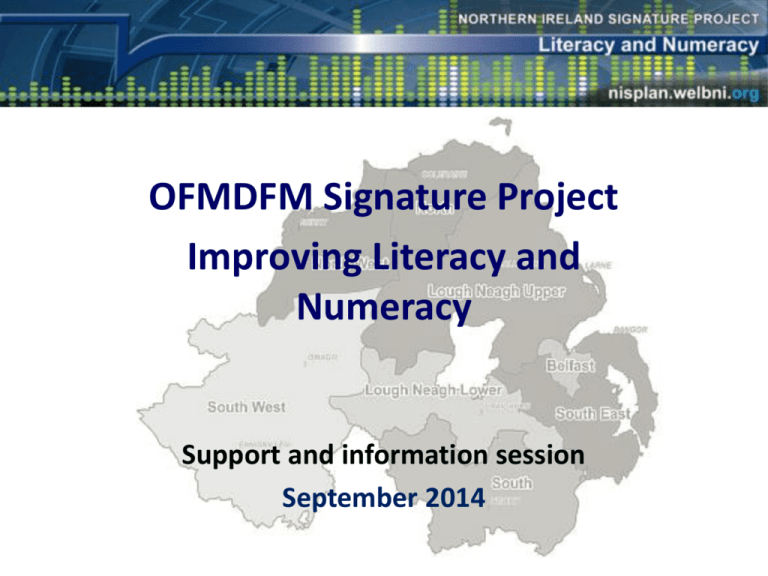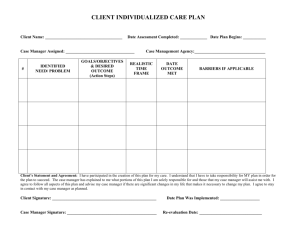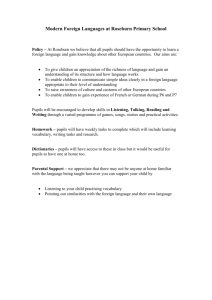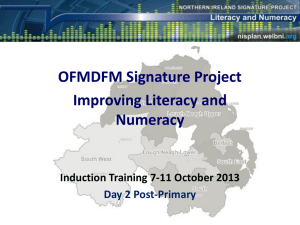Signature Project - WELB Curriculum and Advisory Support Service
advertisement

OFMDFM Signature Project Omm Improving Literacy and Numeracy Support and information session September 2014 OFMDFM Signature Project This course aims to : • provide an update of Signature • inform about the key elements for Year 2 • inform about Common Metric Questionnaire • share effective practice from Year 1 OFMDFM Signature Project Programme • • • • Year 1 Action Plans Monitoring Evaluation – End of Year Report (end of September 14) • Year 2 • Action plans will be copied forward – schools will adapt and submit for assessment (end of October 14) • Monitoring – 2 Periods • Evaluation • Plenary OFMDFM Signature Project Signature Project Evaluation - electronic version on the website but schools must complete their action plan and their monitoring forms to access this form. Excel Spreadsheet for data – see next slide OFMDFM Common Metrics Questionnaire – this will be available through “Fronter” ETI – is currently planning visits to schools in Term1 to specifically evaluate Signature OFMDFM Signature Project Data Collection – Excel Sheet Email directly to the schools and return to Michael Burns by email. OFMDFM Signature Project Teachers Appointed • • • • 225.4(FTE) – OFMDFM 32.4(FTE) – DE 2(FTE) – by schools 260.7(FTE) – Appointed Overall 300 individual teachers employed • 208 – Seconded Teachers (1 days training) • 73 – Centrally Recruited (5 days training) • Cohort 5 have just completed 2 days training OFMDFM Signature Project Overall Data – NISPLAN Website • 3042 – Primary Pupils Supported o 1561 – Literacy o 1402 – Numeracy o 79 – Irish • 6658 – Post Primary Pupils Supported o 3023 – English o 3635 – Mathematics OFMDFM Signature Project Centrally Recruited Teachers – Evaluation Documents Post Primary CR Support 2013/14 Signature Classes Supported 255 Pupils Supported 2305 Teachers Supported 186 OFMDFM Signature Project Centrally Recruited Teachers – Evaluation Documents Primary CR Support 2013/14 Signature Classes Supported 89 Pupils Supported 767 Teachers Supported 73 OFMDFM Signature Project Centrally Recruited Teachers – Evaluation Documents Overall CR Support 2013/14 Totals Classes Supported 344 Pupils Supported 3072 Teachers Supported 259 OFMDFM Signature Project Analysis of the Monitoring Documents on NISPLAN Comments from Monitoring “Discussions with class teachers have highlighted an increase in confidence for children when attempting numeracy work. Children are enthusiastic about the withdrawal lessons and always participate well. All children receiving intervention support have successfully been awarded a Level 4 in numeracy and so have achieved their target.” OFMDFM Signature Project Analysis of the Monitoring Documents on NISPLAN Comments from Monitoring “Establish greater contact with parents including face to face meetings with the parents of targeted pupils.” “High level of participation from students during in-school sessions Student, parent and teacher questionnaires carried out in January indicated marked improvement in student selfesteem and attitude towards learning and exams. Parent meeting provided valuable and positive feedback. Teacher records in regular English lessons indicate improved marks and anecdotal evidence from English teachers noted how much more positive students were about their English. Improved controlled assessments, attendance at after school sessions are positive and students are actively seeking help and support, even out of normal lesson time.” OFMDFM Signature Project Analysis of the Monitoring Documents on NISPLAN Comments from Monitoring “Therefore after one full term (the second term) with the Signature Project pupils I feel better equipped to express opinions on the work covered and discuss the level of progress of individual pupils. Initially, it was decided to raise the profile of reading within the cohort of pupils. I wished to make reading a regular, enjoyable experience which embraced a lifeskill element. The concept of reading in one's spare time became a pivotal aim. Reading became a time filler, a life skill and a hobby all in one. My sense of drive ensured that I convinced my pupils of the importance of the art of reading which could enrich their life experiences. Trying to work with a spread of reading ability throughout the cohort provided direction and purpose.” OFMDFM Signature Project What worked and why? Team teaching therefore support for all groups in class. One-to-one or small groups led to greater identification and addressing of needs. Additional support classes after school. Creating and developing new resources. Pupil self-assessment targets. Assessment for Learning strategies, especially formative feedback. More questions asked by pupils. OFMDFM Signature Project What worked and why? • • • • • • • Groupings of pupils. Whole smaller class created in Year 11. Talking and Listening – small group setting. Building rapport with pupils. Growing knowledge of GCSE requirements. Close monitoring of progress. Sharing good practice. OFMDFM Signature Project What worked and why? Observation of experienced teachers. Clear use of exam question material – modelling answers. Not so much ‘juggling’ of different papers in maths. Use of ICT – Fronter for resources. Use of data. Building of pupils’ confidence. Availability of support outside the timetable. Singing with groups! Using existing intervention supports e.g. “Aim High”. Tailored tutoring to their needs. Showing genuine care by actions and words/building confidence by praise. OFMDFM Signature Project How did your involvement with pupils’ impact on their learning experiences in the mainstream classroom, elsewhere in the school or at home? More confident, engaged, independent pupils. Questioning improved in other subjects. Pupils brought their needs to the attention of the teacher now. Behaviour improved. Revision techniques used in other subjects. Sharing effective practice, reflective feedback with Head of Department. Newer teaching strategies used. Exam strategies, at all levels. Improved extended writing e.g. history. Going on residential with group – self-esteem and confidence. OFMDFM Signature Project How did your involvement with pupils’ impact on their learning experiences in the mainstream classroom, elsewhere in the school or at home? Better attendance at revision classes. Small groups bringing out real issues, fewer distractions and secure learning environment. All at the one level, not afraid to make mistakes. Peer learning. Better effort at homework, sense of pride. Used pupil questionnaire to gauge impact. Improved pupil concentration. Sharing resources/information. OFMDFM Signature Project What challenges did you encounter? Timetabling. Lack of respect as a young teacher – classroom assistant. Behaviour – pupils challenging- learned the reward/sanction system. Poor attendance. Starting later in the year – no time to see progress. No specific room (accommodation). Increased knowledge of exam requirements. Negative, awkward pupils, not engaged at the beginning, poor perception of project. Difficult to motivate girls during maths – break everything down. Bringing parents on board. Role in the school backfill/CR confusion. Too many pupils in target group. Seeing pupils regularly, not being taken out. Record-keeping. OFMDFM Signature Project What challenges did you encounter? 2 schools, 2 exam boards therefore confusing and tiring – following up behaviour issues – collecting work. Internal IT/email Convincing the department that the Signature teacher had the required skills. Next year’s Year 11 Signature group are form class. Overcoming stigma attached to withdrawal. “The aim of the signature project was to achieve ‘success’; it had no connection to ‘failure.” Not seeing pupils frequently enough to make a difference. Greater communication within school. Some teachers unwilling to let pupils go. OFMDFM Signature Project OFMDFM Signature Project pupils parents 7 quality indicators Collaboration & communicati on teachers Effective Signature intervention leadership Monitoring & evaluating planning OFMDFM Signature Project pupils • Correctly identified, • data used effectively, • moved in and out of intervention, involved in their learning, • setting targets • chosen well- either recruited by WELB (CR), or appointed by their school on secondment (S) or to fill the Backfill post (BF) • equipped to know what to do • plan appropriately • use a variety of strategies teachers • tailor intervention to suit pupils • track their pupils’ progress. OFMDFM Signature Project leadership • supportive of the aims of Signature, at HOD level, at SMT/ Principal level and as teacher-tutor; • set clear direction, plan intervention carefully and integrate the Signature teacher(s) into plan for school improvement • promote the Signature intervention model as a legacy for the school. OFMDFM Signature Project planning • • • • appropriate and flexible at all levelsclassroom work is tailored and adapted timetables are suitable allowing for monitoring and evaluation of the strengths and weaknesses of the model used • ongoing assessment is used throughout. ACTION PLANS are detailed and real, recorded online and regularly reviewed and adjusted; school tracking and pupil targetsetting are used. Monitoring & evaluating OFMDFM Signature Project parents involved from the beginning and kept informed of progress. • evident within and between schools- sharing strategies, resources and ideas. • evident between lead school and other schools, involving the teachers at all points Collaboration & Communication OFMDFM Signature Project The Legacy of the project … the true measurement of success (of Signature) will take me far beyond the End of Key Stage. It will be judged in value added results, life forming habits that go beyond simple test scores. It is not just about their ability to use/develop important literacy skills across the curriculum. It is about continuing to use these skills and habits in real life situations. This in itself requires self-confidence and understanding. I am confident that this will happen for some of my pupils. Increasing this percentage is not only a personal goal but an overall aim shared by the school. I am also confident that our End of Key Stage 2 results will improve next year and beyond. For the most part the work that continues on a daily basis has been worthwhile and enjoyable for all concerned. The challenge still remains, “To work hard, express ourselves clearly, listen to others, to feel valued and thus to succeed”. Barrie McGowan – Good Shepherd Primary School- ( taken from Year 1 Monitoring form)







